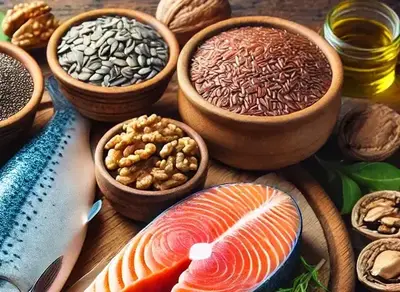The Connection Between Diet and Eye Health

Eye inflammation can be a frustrating and even debilitating condition that impacts daily life. Whether caused by allergies, infections, or chronic conditions, inflammation of the eye leads to redness, irritation, and discomfort. Fortunately, what we eat can play a significant role in managing and reducing eye inflammation. This article explores how you can use diet as a powerful ally to soothe inflammation and maintain healthy eyes.
Understanding Eye Inflammation and Its Causes
Eye inflammation occurs due to various triggers—allergies, autoimmune disorders, infections, or even poor diet. Common symptoms include redness, swelling, and discomfort. While prescription medications can help alleviate symptoms, a proactive approach through diet offers a long-term solution with additional overall health benefits.
How Diet Can Help with Eye Inflammation
Diet plays an essential role in regulating inflammation in our bodies. Anti-inflammatory foods, rich in antioxidants, omega-3 fatty acids, and essential vitamins, can help soothe inflamed eyes and prevent recurring episodes. Let’s dive into some of the key dietary elements that can support your journey to reducing eye inflammation.
The Best Foods for Reducing Eye Inflammation
1. Omega-3 Rich Foods
Omega-3 fatty acids are renowned for their anti-inflammatory properties. They help reduce inflammation throughout the body, including in the eyes. Consider including these foods in your diet:
- Fatty Fish: Salmon, mackerel, and sardines are excellent sources of omega-3.
- Chia Seeds: Packed with omega-3s, they are easy to incorporate into smoothies or oatmeal.
- Walnuts: These nuts are a versatile snack with a good amount of omega-3 fatty acids.
Studies show that individuals who consume more omega-3-rich foods tend to have lower levels of inflammation, including eye inflammation (Source: American Journal of Clinical Nutrition).
2. Antioxidant-Rich Vegetables
Antioxidants help to neutralize free radicals, which can contribute to inflammation. Vegetables rich in vitamin C, beta-carotene, and lutein are particularly beneficial:
- Spinach and Kale: Leafy greens contain lutein and zeaxanthin, which are powerful antioxidants that support eye health.
- Carrots: Rich in beta-carotene, these root vegetables aid in maintaining proper vision and reducing inflammation.
- Bell Peppers: High in vitamin C, bell peppers can help reduce oxidative stress in the eyes.
As Dr. Hannah Blake from the American Academy of Ophthalmology notes, “A diet rich in antioxidants can significantly reduce the risk of eye inflammation and age-related eye disorders.”
3. Fruits That Fight Inflammation
Certain fruits are loaded with anti-inflammatory compounds that promote better eye health:
- Berries: Blueberries, strawberries, and blackberries are loaded with antioxidants called anthocyanins, which can help fight inflammation.
- Oranges: Citrus fruits, especially oranges, are rich in vitamin C, an antioxidant that aids in tissue repair and reduces inflammation.
- Pineapple: Pineapple contains bromelain, an enzyme that can help reduce inflammation.
4. Herbs and Spices for Inflammation Relief
Adding specific herbs and spices to your cooking can help combat inflammation:
- Turmeric: The active compound curcumin in turmeric has potent anti-inflammatory effects. Consuming turmeric regularly can reduce overall inflammation.
- Ginger: Ginger contains compounds known as gingerols, which have been shown to have anti-inflammatory properties.
5. Healthy Fats
In addition to omega-3s, other healthy fats can help reduce inflammation.
- Extra Virgin Olive Oil: Rich in oleocanthal, olive oil has similar anti-inflammatory effects to over-the-counter medications like ibuprofen (Source: Harvard Medical School).
- Avocados: Full of healthy fats, avocados can help improve the body’s absorption of antioxidants from other foods.
Foods to Avoid
Just as important as eating the right foods is avoiding those that can contribute to inflammation. Some common offenders include:
- Refined Carbohydrates: Foods like white bread and sugary snacks can trigger inflammation.
- Processed Meats: Sausages, hot dogs, and similar foods contain preservatives and unhealthy fats that can worsen inflammation.
- Fried Foods: Fried and greasy foods increase oxidative stress, which can lead to more inflammation.
Sample Meal Plan for Reducing Eye Inflammation
Breakfast: Smoothie with spinach, blueberries, chia seeds, and almond milk.
Lunch: Quinoa salad with kale, bell peppers, carrots, and grilled salmon.
Snack: A handful of walnuts and an orange.
Dinner: Stir-fried vegetables (broccoli, carrots, bell peppers) with ginger and turmeric, served with brown rice.
Dessert: Pineapple slices with a sprinkle of cinnamon.
Table: Anti-Inflammatory Foods for Eye Health
| Food Group | Foods to Include | Nutrients |
|---|---|---|
| Omega-3 Rich | Salmon, Chia Seeds, Walnuts | Omega-3 Fatty Acids |
| Antioxidants | Spinach, Kale, Bell Peppers | Lutein, Vitamin C |
| Fruits | Blueberries, Oranges, Pineapple | Anthocyanins, Vitamin C |
| Healthy Fats | Olive Oil, Avocados | Oleocanthal |
Lifestyle Tips for Reducing Eye Inflammation
- Stay Hydrated: Proper hydration helps flush out toxins and reduces inflammation.
- Limit Screen Time: Digital eye strain can exacerbate inflammation, so take regular breaks.
- Practice Eye Hygiene: Keeping your eyes clean can help prevent infections that lead to inflammation.
Small Changes Lead to Big Results
Diet plays a pivotal role in managing eye inflammation. By incorporating anti-inflammatory foods, you can effectively reduce discomfort and support overall eye health. The key is consistency; adopting a healthier diet filled with antioxidants, omega-3s, and essential vitamins can provide the lasting relief you seek.
As Dr. Mark Reynolds of the National Eye Institute aptly says, “The right diet can significantly reduce inflammation and help maintain optimal eye health.”
Remember, dietary changes do not replace medical treatments, but they can serve as a powerful complement to support your journey to healthy, inflammation-free eyes.



